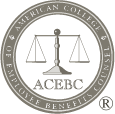William (Bill) A. Schmidt
William A. Schmidt, who died in 2023 at age 75, built a distinguished career as a lawyer whose practice focused on employee benefits under the Employee Retirement Income Security Act of 1974 (“ERISA”). Bill was inducted in 2000 as a Charter Fellow of the American College of Employee Benefits Counsel (the “College”).
Bill graduated in 1970 with a B.A. from the University of Virginia and earned his J.D. in 1973 from the University of Virginia School of Law. He began working at Connecticut General Life Insurance Company (later part of Cigna) in Hartford, CT and subsequently, in the early 1980s, served as an attorney in the Office of the Solicitor, U.S. Department of Labor (“DOL”) in Washington, DC. While in Washington, he earned his LL.M. degree in 1983 from Georgetown University Law Center.
During the early years of his career, he participated in developing guidance on the fundamentals of ERISA. One of his projects at DOL was helping to draft key regulations defining “plan assets” under ERISA which clarified the circumstances under ERISA section 404(c) when a participant would be considered to have exercised control over an individual account (meaning plan fiduciaries would not be liable for losses). This exception from fiduciary liability became an important incentive for employers to adopt defined contribution plans, such as Internal Revenue Code section 401(k) plans.
After government service, he became a partner at Akin Gump Strauss Hauer & Feld LLP; then at Paul, Hastings, Janofsky & Walker; and then at Kirkpatrick & Lockhart LLP (later, K&L Gates) where he practiced for more than 20 years before retiring. His practice areas included securities law, employee benefits, executive compensation, investment management, hedge funds, and alternative investments.
Even in private practice, Bill’s work helped establish ERISA law, such as the issuance to his client of the groundbreaking “SunAmerica advisory opinion” (Advisory Opinion Letter 2001-09A from Louis Campagna, Chief, Division of Fiduciary Interpretations, Pension and Welfare Administration (Dec. 14, 2001).
Bill testified before ERISA Advisory Council Working Groups, including on July 17, 2002, the Working Group on Fiduciary Education and Training, where he suggested more DOL guidance about fiduciary education. Bill observed that “most fiduciaries want to be compliant” and stressed the need for “standards that are predictable, consistent and well articulated.” Bill indicated that an important way to improve fiduciary performance was to improve the quality of services provided by vendors. “The quality of service is only going to get raised if the plan sponsors are demanding. Plan sponsors are only going to demand if they realize that ultimately they’re at risk.” He also testified on September 20, 2006, to the Working Group on Plan Asset Rules, Exemptions and Cross-Trading.
He taught as an adjunct professor at the Georgetown University Law Center and served as a frequent speaker at ALI-ABA conferences. Bill was a well-respected and sought-after editor and advisor to leading industry publications — the Probate & Property Employee Benefits Update, the Benefits Law Journal, the Journal of Pension Planning and Compliance, and The Investment Lawyer.
One of Bill’s areas of focus and scholarship included the developing use of mutual funds in Internal Revenue Code section 401(k) plans as well as ERISA section 404(c) diversification requirements. His outline, entitled “ERISA Development Relating to Mutual Fund Distributions,” SC49 ALI-ABA 57 (Feb. 5, 1998), was cited for its description of the application of prohibited transaction rules and exemptions to investments in mutual funds. See Boeckman v. A.G. Edwards, Inc., 461 F.Supp.2d 801 (S.D. Ill. 2006).
Known as a wonderful man who was a great mentor to many, Bill also was a man of many interests. He was a leader and volunteer in his community, where he served on Board of Zoning Appeals in Greene County, VA.
As a lawyer who helped to interpret and apply ERISA in its formative years, his foundational work and later scholarship left its mark on the law.
Photo Source: The Daily Progress, https://dailyprogress.com/william-aubrey-schmidt/article_2c301a82-9dee-5b60-81f0-5683aeddd881.html


